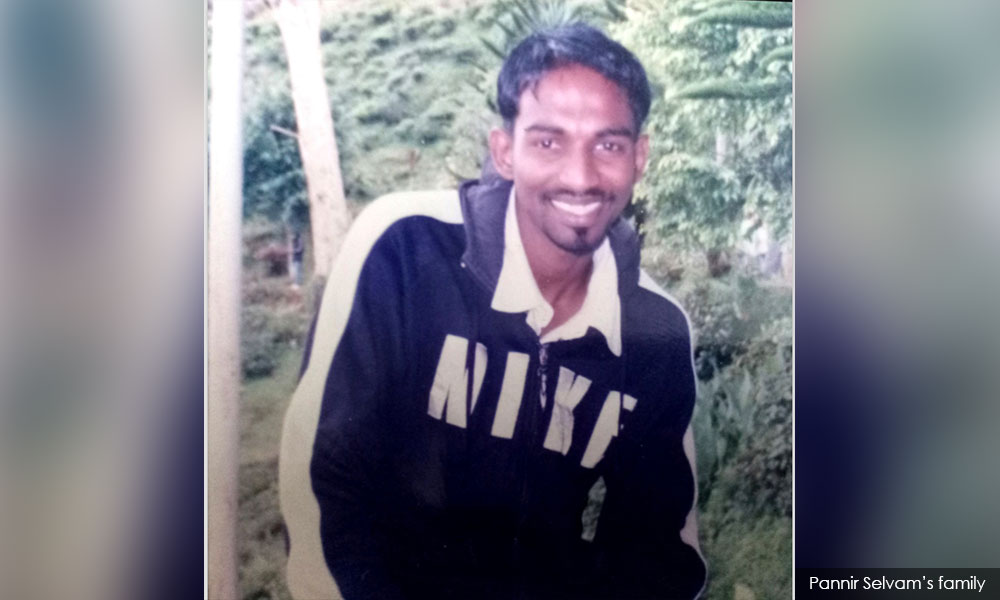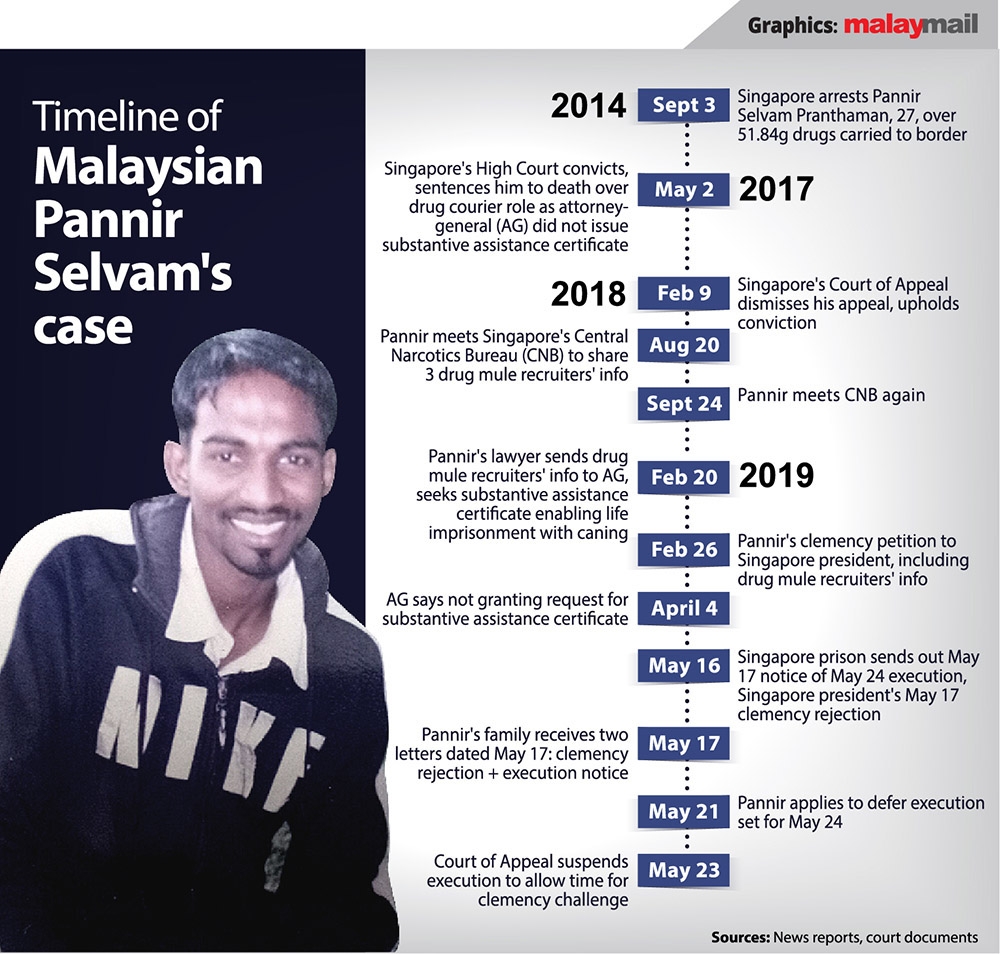So many people are calling for the LIFE of Malaysian Christian Pannir Selvam, but what is most disturbing is that we do not hear PM Anwar Ibrahim and the Malaysian government doing the same - Is it too small an issue for PM Anwar? Pannir Selvam(to be hanged on 20/2/2025) - will demonstrate who PM ANWAR Ibrahim is? Will Singapore stop execution out of respect to Anwar and Malaysia? Philippines succeded in saving life, can Malaysia?
PM
Anwar Ibrahim’s cares about Najib’s sufferings in prison but does
Malaysia also care about Malaysians overseas at threat of being executed
to death like Pannir Selvam..(MADPET)
Media Statement No. 14-2025_SUHAKAM Calls Upon Malaysian Government to Intensify Effort to Appeal Clemency for Pannir Selvam
KUALA LUMPUR (19 FEBRUARY 2025) – The Human Rights Commission of Malaysia (SUHAKAM) calls upon the Malaysian Government to intensify its diplomatic efforts in appealing to the Singaporean Government to halt the execution and seek clemency on behalf of Pannir Selvam s/o Pranthaman.
Pannir Selvam, a mere courier, has been sentenced to death under a mandatory penalty that disregards the mitigating circumstances of his case. This sentence is a stark deviation from international human rights standards, and we are deeply concerned about the irreversible consequences of capital punishment, especially in instances where mercy and leniency should be considered.
SUHAKAM’s stance against the death penalty is rooted in our unwavering belief in justice, dignity, and the possibility of rehabilitation for all. The mandatory death sentence strips judges of the discretion to weigh the individual circumstances of each case, undermining the principles of fairness that should form the foundation of any legal system. Although Article 6 of the International Covenant on Civil and Political Rights (ICCPR) permits the use of the death penalty only for the ‘most serious’ crimes, SUHAKAM wishes to emphasize that the Human Rights Committee, which interprets the Covenant, has consistently ruled that drug-related offences do not meet this standard.
The planned execution of Pannir Selvam also violates Article 3 of the Universal Declaration of Human Rights (UDHR), which affirms that “everyone has the right to life, liberty and security of person.” The irreversible nature of the death penalty, particularly in cases with significant mitigating factors, erodes the core values of human dignity and justice.
SUHAKAM stands in support of the statement by UN experts, urging Singaporean authorities to halt the execution of Pannir Selvam and commute his death sentence to imprisonment in line with international human rights law and standards. SUHAKAM stands firm in advocating for justice, compassion, and the inherent rights of all individuals, regardless of nationality or circumstance and therefore, we urge all involved to choose mercy and humanity over irreversible punishment.
-END-
The Human Rights Commission of Malaysia (SUHAKAM)
Date: 19 February 2025
Summary
United Nations experts appeal to the Singapore and Malaysian governments ahead of Pannir Selvam Pranthaman’s execution tomorrow.
They urge Putrajaya to “take any steps at their disposal to support Pannir’s case”.
United Nations (UN) experts have urged Singapore to halt the execution of Malaysian prisoner Pannir Selvam Pranthaman for drug trafficking.
The 37-year-old is scheduled to be hanged tomorrow at dawn. He was informed of the execution on Sunday (Feb 16).
The seven experts also called on Malaysian authorities to “take any steps at their disposal to support Pannir’s case”.
“We have repeatedly called on Singapore to halt executions for drug offences which are illegal under international human rights law on several grounds,” said the experts in an article posted on the UN website.

“We reiterate that under international law, only crimes of extreme gravity involving intentional killing meet the threshold for the death penalty. Mandatory death sentences are inherently over-inclusive and inevitably violate human rights law,” they said.
“There is no evidence that the death penalty does more than any other punishment to curb or prevent drug trafficking,” they added.
The experts are:
Morris Tidball-Binz, UN special rapporteur on extra-judicial summary or arbitrary executions
Margaret Satterthwaite, UN special rapporteur on the independence of judges and lawyers
Matthew Gillett, chair rapporteur for the UN working group on arbitrary detention
Ganna Yudkivska, vice-chair (communications) of the UN working group on arbitrary detention
Priya Gopalan, vice-chair (follow up) of the working group on arbitrary detention
Miriam Estrada Castillo, international expert of the working group on arbitrary detention - Malaysiakini, 19/2/2025
LawAsia joins clemency calls for death row Malaysian Pannir Selvam ahead of Singapore execution

KUALA LUMPUR, Feb 19 — Law Association for Asia and The Pacific (LawAsia), a regional organisation promoting legal cooperation, today expressed deep concern over the upcoming execution of convicted Malaysian Pannir Selvam Pranthaman who faces execution in Singapore tomorrow.
Shyam Divan, president of LawAsia, emphasised that the organization has long advocated against the death penalty.
“LawAsia reiterates its 2018 resolution calling for a moratorium on the implementation of the death penalty in the Asia-Pacific region,” he said in a statement.
In 2018, LawAsia called on governments in the Economic and Social Commission for Asia and the Pacific – a regional development arm of the United Nations that covers countries in Asia, the Pacific and some parts of the Middle East – that retain the death penalty to review their policies on capital punishment.
The association also urged a moratorium on executions in regions where reviews of death penalty policies are underway.
Shyam further supported an earlier statement from the Commonwealth Lawyers Association, issued yesterday, which called on Singapore to uphold international human rights standards.
“We call upon the government of Singapore to adhere to international human rights standards and obligations,” he said.
LawAsia also urged the President of Singapore to consider using clemency powers under Article 22P (1) of Singapore’s Constitution to commute Pannir Selvam’s death sentence.
“This would be a crucial step in ensuring justice and upholding human rights,” Shyam said.
Earlier today, the Commonwealth Lawyers Association issued an urgent appeal to the Singapore government to halt Pannir Selvam’s hanging tomorrow.
The 36-year-old was convicted in 2017 for acting as a drug courier and handed the mandatory death penalty under Singapore’s Misuse of Drugs Act.
He had claimed to have cooperated with authorities by providing information on the actual trafficker but was denied a Certificate of Substantive Assistance that could have spared him from capital punishment.
His clemency application was also rejected by the President of Singapore, leaving Pannir with no further legal recourse.
Pannir Selvam’s scheduled execution has reignited debates about the harsh penalties for drug-related crimes in Singapore, which continues to enforce strict anti-drug laws.
UN rights office calls for Singapore stay of execution for Malaysia nationals

In Singapore, the UN rights office, OHCHR, called on Monday for a stay of execution for two Malaysian nationals accused of drug offences.
The execution of Nagaenthran Dharmalingam and Datchinamurthy Kataiah is imminent, the UN rights office said in a statement, before pointing to an apparently “alarming acceleration in execution notices” in Singapore, since the start of the year.
OHCHR spokesperson Ravina Shamdasani said that Mr. Dharmalingam was arrested in 2009 and convicted of drug trafficking.
His family was told just last week that he was due to be executed this Wednesday.
Multiple appeals claiming that he had an intellectual disability were dismissed and requests for clemency denied, Ms. Shamdasani explained.
The second prisoner facing execution, Mr. Kataiah, was arrested in 2011 and convicted on charges of trafficking diamorphine into Singapore. Last week, his family received notice that he would be executed on Friday.
Death row offences
After more than a two-year pause, on 30 March, Singapore executed Abdul Kahar bin Othman, following his conviction for drug-related offences.
Today, at least three other men found guilty of drug-related offences are at risk of the death sentence, OHCHR has warned, identifying them as Roslan bin Bakar, Rosman bin Abdullah and Pannir Selvam Pranthaman.
In addition, more than 50 people are reportedly on death row in Singapore.
Abolitionist momentum
According to the UN Human Rights Committee, around 170 States have abolished or introduced a moratorium on the death penalty, either in law or in practice.
Despite this growing trend, the UN-appointed independent panel explained that a small number of countries have retained executions, largely because of the belief that they deter crime. A few States also still permit the death penalty for crimes other than those of extreme gravity involving intentional killing, including for drug-related or terrorism charges, the Committee said.
“More work needs to be done,” according to its website, which says that the universal abolition of the death sentence “is necessary for the enhancement of human dignity and progressive development of human rights”.
Such a move would be in accordance with General Assembly resolutions, likeminded Member States, civil society, UN Special Procedures mandates and others who have campaigned for a moratorium on the death penalty and ultimately its abolition worldwide, the Committee explained.
Incompatible with international law
Echoing that message, Ms. Shamdasani insisted that sentencing people to death for drug-related offences was “incompatible with international human rights law”, adding that countries that have not yet abolished the death penalty should only impose it for the “most serious crimes”, which is usually interpreted as crimes of extreme gravity involving intentional killing.
Commutation call
“We urge the Singaporean authorities to immediately halt its execution plans, to consider granting [Mr.] Dharmalingham and [Mr.] Kataiah clemency, and to commute their sentences to prison terms,” Ms. Shamdasani said.
OHCHR also urged the Singaporean authorities to review its long-standing position on the death penalty, citing “increasing evidence showing its ineffectiveness as a deterrent”, and to consider implementing a moratorium on all death sentences, pending such a review. - UN, 25/4/2022






No comments:
Post a Comment